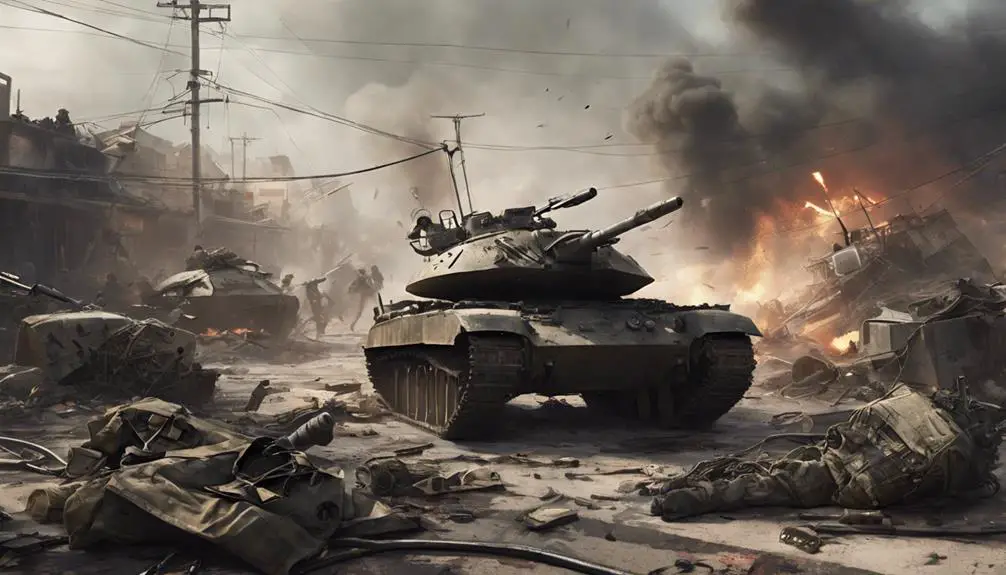You've heard of FUBAR and SNAFU, but do you know the origins of these military slang terms? They're more than just witty acronyms – they represent a long history of soldiers coping with chaotic and messed-up situations. FUBAR stands for "Fouled Up Beyond All Recognition," while SNAFU means "Situation Normal: All Fouled Up." These phrases not only express frustration but also reflect the evolution of military slang. As you explore the complexities of modern warfare, you'll discover more about the significance of clear communication in the face of chaos and confusion – and just how these slang terms have adapted to the changing landscape of warfare.
Origins of Military Slang
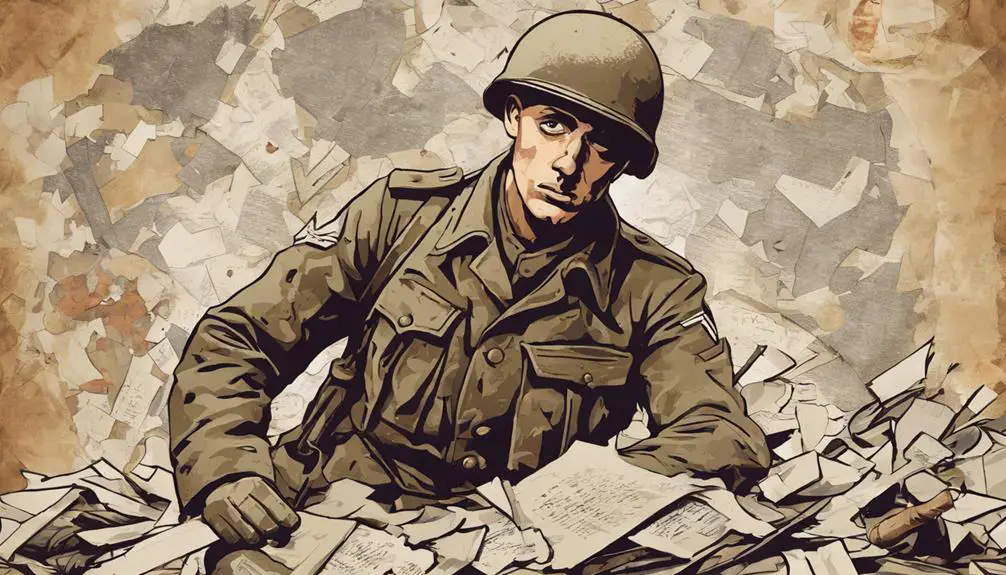
Your exploration into military slang likely begins with the realization that it's been a part of military culture for centuries, with its roots tracing back to the early days of warfare. You might wonder how this unique language evolved, and the answer lies in linguistic adaptation and cultural influence. As armies clashed, soldiers from diverse backgrounds came together, bringing their own languages and dialects. To communicate effectively, they adapted their language to create a shared vocabulary, blending words and phrases from their native tongues. This blending of languages led to the creation of distinct military slang, which served as a common language among soldiers.
Cultural influence also played a significant role in shaping military slang. As armies moved across regions, they adopted local colloquialisms and incorporated them into their language. This cultural exchange resulted in a unique blend of words, phrases, and expressions that were both functional and flavorful. The evolution of military slang was a gradual process, shaped by the interactions between soldiers from different cultural backgrounds. As you explore further into the world of military slang, you'll discover how this linguistic adaptation and cultural influence have contributed to its rich and varied vocabulary.
FUBAR and Beyond
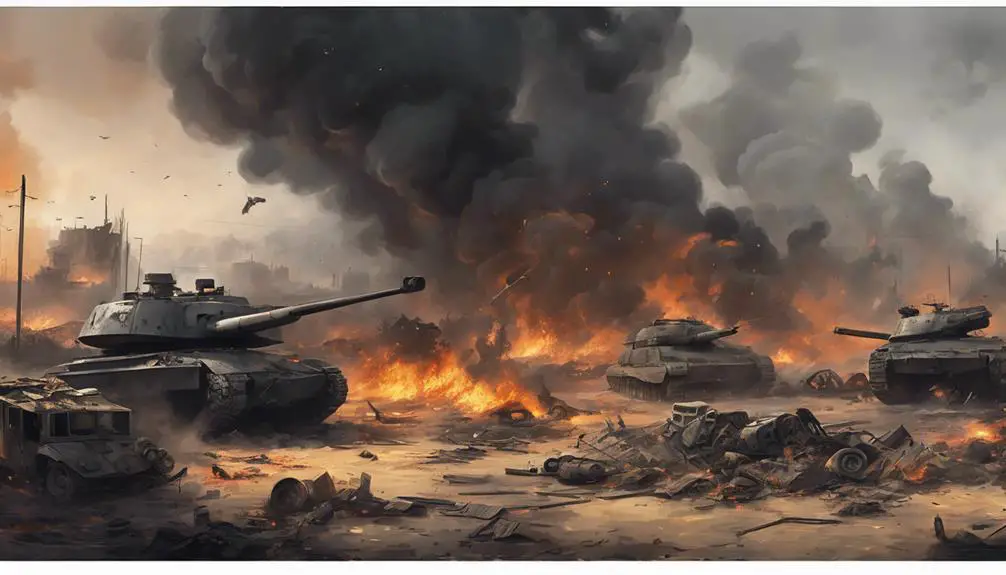
Delving into the world of military slang, you'll encounter a plethora of colorful expressions, with FUBAR being one of the most notorious terms to emerge from the trenches. FUBAR, an acronym for "Fouled Up Beyond All Recognition," is often used to describe messed up missions or botched briefings that have gone awry. When a situation is FUBAR, it's beyond salvation, and the only option is to regroup and start anew.
In the heat of battle, military personnel often rely on slang to quickly convey complex ideas or emotions. FUBAR is just one of many terms used to express frustration or disappointment. When a mission goes sideways, it's not uncommon to hear a soldier mutter, "This op is FUBAR." It's a succinct way to acknowledge that things have gone wrong and that it's time to reassess.
While FUBAR is often used in a humorous or ironic way, it's a reminder that even in the chaos of war, soldiers find ways to cope with the unpredictable nature of combat. By using slang like FUBAR, military personnel can momentarily find levity in an otherwise dire situation.
SNAFU in the Trenches

As you venture deeper into the trenches of military slang, you'll stumble upon another infamous term: SNAFU, which stands for "Situation Normal: All Fouled Up." This phrase, born from the chaos of World War II, has become synonymous with the unpredictable nature of combat. When you're in the trenches, SNAFU is more than just an acronym – it's a state of mind. It's the realization that, no matter how well-planned your mission is, things can (and will) go awry.
In the heat of battle, SNAFU becomes a constant companion, lurking in every shadow, waiting to pounce. Trench troubles, like malfunctioning equipment or poor communication, can quickly escalate into full-blown combat chaos. When SNAFU strikes, it's every soldier for themselves, fighting to regain control of the situation. It's a baptism by fire, where the strong adapt and the weak are left behind. So, the next time you're knee-deep in the trenches, remember: SNAFU is always lurking, waiting to turn your world upside down.
Chaos in the Field
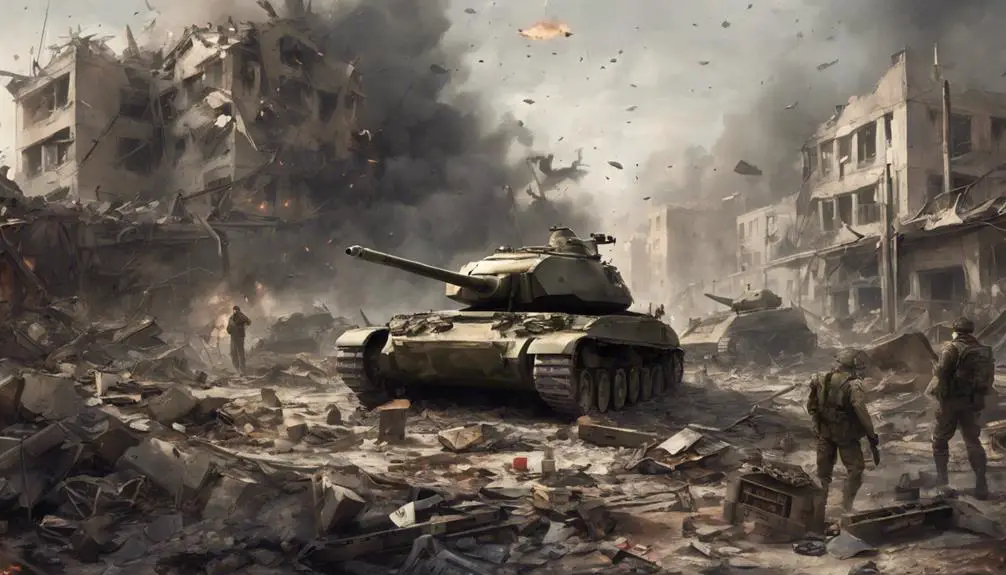
When SNAFU rears its head, chaos in the field is never far behind, and you'll soon find yourself maneuvering through a maelstrom of confusion, miscommunication, and equipment failures. You'll be forced to think on your feet as the situation spirals out of control, and every decision you make will have a ripple effect on the outcome.
As battle fatigue starts to set in, your judgment will be clouded, and even the simplest tasks will become challenging obstacles. It's crucial to stay focused and prioritize your objectives, but when everything is going wrong, it's easy to lose sight of what's important.
A tactical overhaul may be necessary to regain control of the situation. This means reassessing your strategy, reorganizing your team, and reallocating resources to maximize your chances of success. It's a difficult and complex process, but with a clear head and a solid plan, you can turn the tide of chaos in the field and emerge victorious. Remember, in the midst of chaos, a cool head and a solid strategy can mean the difference between victory and defeat.
Botched Ops and Blunders
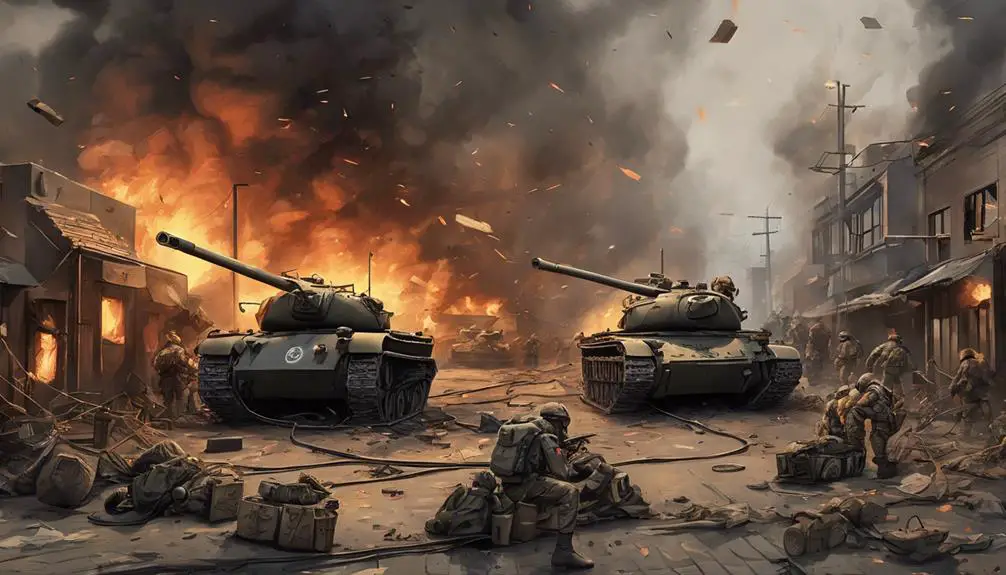
Botched ops and blunders can be the ultimate equalizer on the battlefield, and you'll often find that even the most meticulously planned missions can go sideways in a heartbeat. You've heard the phrase 'no plan survives contact with the enemy,' and it's an important reality that even the best-laid plans can quickly devolve into chaos.
In the heat of battle, a single misstep can turn a tactical victory into an Operation Blunder. You might've experienced it firsthand – a Tactical Flop that leaves you wondering what went wrong. Maybe it was a miscommunication, a miscalculation, or a simple mistake, but the result is the same: a botched op that puts everyone's lives at risk.
When you're in the thick of it, it's easy to get caught up in the chaos and lose sight of what's going on. But as you reflect on the mission, you'll often realize that it was a series of small mistakes that added up to a big failure. Identifying those mistakes is important to learning from them and avoiding future blunders. By analyzing what went wrong, you can refine your tactics and come back stronger next time.
When Communication Fails

Your team's success hinges on clear communication, but you've likely been in situations where a single misheard or misunderstood order sent the entire op off the rails. In the heat of the moment, a simple miscommunication can lead to catastrophic consequences. Radio silence, whether intentional or unintentional, can be deadly. You've experienced it firsthand – an order is given, but the transmission is garbled, or the receiving party is distracted, and suddenly, your team is lost in translation.
In the chaos of battle, a single misstep can have far-reaching consequences. You've seen it happen – a simple mistake, a misheard phrase, and suddenly, the entire operation is compromised. The consequences are dire, and the blame game begins. But it's not about pointing fingers; it's about recognizing the importance of clear communication. You know that effective communication is key to success, and a single miscommunication can mean the difference between life and death. It's a harsh reality, but one you've learned to live with.
Military Mayhem and Madness
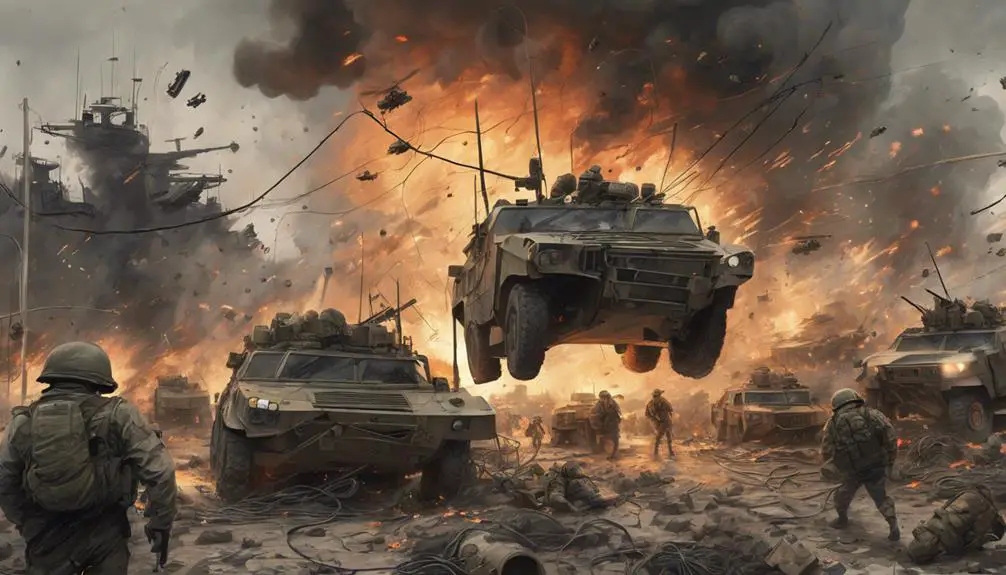
In the fog of war, chaos can quickly spiral out of control, leaving you to navigate a maelstrom of miscommunication, confusion, and downright mayhem. You've heard the phrase 'when things go sideways,' but in the military, it's not just a figure of speech. It's a vital reality that can mean the difference between life and death. That's why warrior wisdom is essential in these situations. It's the ability to think on your feet, adapt to chaos, and make quick decisions to mitigate disaster. But even the best-laid plans can go awry, and that's when drill sergeant disasters come into play. Remember that time when your unit's comms equipment malfunctioned, or the intel was inaccurate, or the logistics were botched? Yeah, that's what we're talking about. It's the perfect storm of military mayhem and madness. And when it hits, you'll need all your wits about you to get out alive. So, buckle up, soldier, and get ready for the wildest ride of your life.
Evolution of Messed Up

As you've experienced the chaos of military mayhem and madness firsthand, you're likely aware that the concept of 'messed up' has evolved considerably over time, from the early days of trench warfare to the high-tech battlespaces of today. In the trenches, 'messed up' meant being caught in no man's land, surrounded by the stench of death and destruction. As warfare evolved, so did the language. In World War II, 'messed up' became synonymous with being lost or disoriented in the midst of battle.
In modern warfare, 'messed up' takes on a new meaning. It's about maneuvering the complexities of modern warfare, where war zone woes and language lunacy can be just as deadly as enemy fire. You've seen it firsthand – the confusion, the chaos, the language barriers that can mean the difference between life and death. Today, 'messed up' is about adapting to the ever-changing landscape of modern warfare, where technology and tactics are constantly evolving. It's about staying one step ahead of the enemy, and one step ahead of the chaos that can engulf you at any moment.
Frequently Asked Questions
Is Military Slang Only Used in the Military?
You might think military slang is exclusive to the military, but that's not entirely true. Take, for instance, the phrase "break a leg," originating from the military's "break a leg, men!" – now widely used in civilian life to wish someone good luck. As military lingo evolves over time, it seeps into everyday language, influencing how civilians communicate. Military slang is no longer confined to the military; it's part of our broader cultural lexicon.
Are FUBAR and SNAFU Interchangeable Terms?
You're wondering if FUBAR and SNAFU are interchangeable terms. While both originated in the military, they have distinct meanings. FUBAR, short for "Fouled Up Beyond All Recognition," emerged during World War II to describe a situation that's hopelessly messed up. SNAFU, or "Situation Normal: All Fouled Up," evolved from FUBAR, initially used to describe the chaos of war. Although related, they're not interchangeable; FUBAR emphasizes the severity of the situation, whereas SNAFU implies a sense of normalcy in the chaos.
How Does Military Slang Affect Civilian Communication?
When you're exposed to military slang, it can impact your communication with civilians in unexpected ways. You may unintentionally use terms that create cultural barriers, leading to misunderstandings. As linguistic evolution blends military jargon into everyday language, you'll need to be mindful of your audience to avoid confusion. Be conscious of your language to guarantee effective communication that transcends cultural and linguistic divides.
Can Military Slang Be Used in Formal Reports?
When you're writing formal reports, it's crucial to ponder the implications of using military slang. Incorporating military lingo in formal documentation can compromise report clarity, potentially leading to misinterpretation. You should avoid using slang terms that might confuse or alienate civilian readers. Instead, opt for standardized language to guarantee your message is conveyed accurately and efficiently.
Are There Any Military Slang Terms Specific to Certain Units?
You're probably familiar with a thousand military slang terms, but unit-specific lingo takes it to a whole new level. In the Special Forces, for instance, "gucci" means good or excellent. The 75th Ranger Regiment has its own slang, like "ranger up" for getting ready quickly. Even the Navy SEALs have their own terms, like "DEVGRU" for their elite counter-terrorism unit. These unit-specific phrases are a badge of honor, and mastering them is key to being part of the team.

